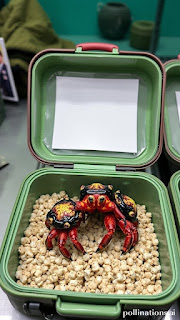Ticker
6/recent/ticker-posts
3 Chinese nabbed for hermit crabs in suitcases
May 08, 2025
<br><br>**Title** Cracking the Case Uncovering the Mystery of Hermit Crabs in Suitcases<br><br>As we navigate the complexities of our world, it's not often that we come across cases that leave us scratching our heads. Such was the case when three Chinese men were arrested in Japan after hotel staff discovered thousands of protected hermit crabs hidden inside their suitcases. This unusual incident has sparked questions about the motivations behind such an act and its significance for knowledge managers in 2025.<br><br>**The Discovery**<br><br>On a Tuesday, a hotel worker in Amami City reported suspicious activity to environmental authorities. The guests had requested that the hotel keep an eye on their luggage, which was making an unusual rustling noise. When two of the three men returned to the hotel, police asked them to reveal the contents of their suitcases. Inside, they found approximately 95 kilograms (210 pounds) of spiral-shelled hermit crabs.<br><br>**The Hermit Crabs National Natural Monuments**<br><br>These hermit crabs are designated as national natural monuments due to their cultural and scientific value. Each crab can command up to 20,000 yen ($140), making this a valuable haul. The police investigation is ongoing to determine whether the men had planned to sell the hermit crabs, keep them as pets, or consume them.<br><br>**Significance for Knowledge Managers**<br><br>As knowledge managers look to the future, they will need to navigate complex issues like data security, information sharing, and knowledge retention. This case highlights the importance of adopting a modicum approach – one that balances sensitivity with openness. By considering multiple perspectives and possibilities, knowledge managers can avoid getting stuck in silos or making rash decisions.<br><br>**Lessons Learned**<br><br>This incident serves as a reminder that even seemingly unrelated events can have far-reaching consequences. For knowledge managers, this means being prepared to adapt to changing circumstances and having a willingness to consider unconventional solutions.<br><br>**The Role of Modicum**<br><br>In 2025, knowledge managers will need to strike a balance between sharing information and maintaining confidentiality. By adopting a modicum approach, they can ensure that sensitive data is protected while still allowing for collaborative learning and innovation.<br><br>**Conclusion**<br><br>The case of the hermit crabs in suitcases serves as a fascinating reminder of the complexities and unpredictability of our world. As knowledge managers look to the future, they must be prepared to navigate these challenges with modicum – balance, proportion, and a willingness to consider multiple perspectives.<br><br>**Keywords** knowledge management, modicum, data security, information sharing, hermit crabs, national natural monuments

Germany swelters as European heatwave moves eastwards
July 03, 2025

Indian, Pakistani troops exchange fire in Kashmir
April 27, 2025

US police hunt gunman who killed lawmaker, husband
June 14, 2025

Pakistan shoots down 25 Indian drones
May 08, 2025

Vietnam apartment block fire kills eight
July 07, 2025
Random Posts
3/random/post-list
Recent in Sports
3/à¦ূগোল%20প্রশ্ন%20ও%20উত্তর/post-list
Popular Posts

Germany swelters as European heatwave moves eastwards
July 03, 2025

Indian, Pakistani troops exchange fire in Kashmir
April 27, 2025

US police hunt gunman who killed lawmaker, husband
June 14, 2025
Menu Footer Widget
Copyright © - StudyNoteGuru All Right Reserved







0 Comments